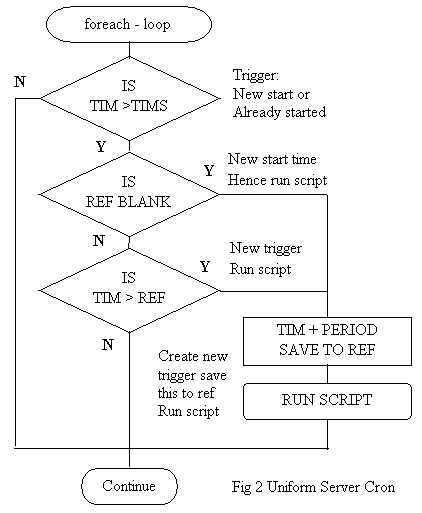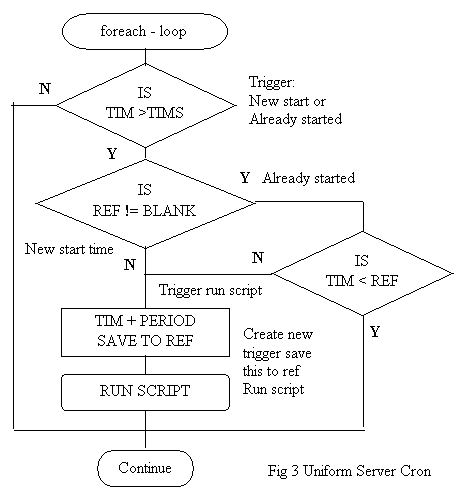Cron Design: Cron Script Part 2: Difference between revisions
New page: {{Nav Cron Design}} At the heart of Uniform Server’s portable Cron is a configuration file. This is periodically read into an array the period is defined by Cron time, which has a defaul... |
m Reverted edits by Upazixorys (Talk); changed back to last version by Ric |
| (One intermediate revision by one other user not shown) | |
(No difference)
| |
Latest revision as of 17:37, 24 November 2010
|
Cron Design: Introduction | Running Cron | Cron Script Part 1 | Cron Script Part 2 | Cron Script Part 3
|
| Uniform Server Portable Cron Design |
At the heart of Uniform Server’s portable Cron is a configuration file. This is periodically read into an array the period is defined by Cron time, which has a default setting of one minute. The array is scanned line-by-line comparing any time settings to the current time on finding a match the corresponding script is run.
This page looks at the foreach loop in detail.
Block Parameters
Before performing any foreach-loop logic processing, option values need to be extracted from the configuration file.
Every time the script is run the configuration file is read into an array. First task of the foreach-loop is to extract a block’s option values. Each time around the loop selects a new block and extracts its option values.
|
Read Configuration file:
|
Function Used: $ini_array = parse_ini_file($file, true); | ||
|
Extract Option Value:
Note: All times are converted to Unix timestamps.
|
Configuration file example: [dtdns] start = 2009-09-21 2:56:52 eriod = 600 ; 10 Mins as required by DtDNS ;path = ..\..\plugins\dtdns_updater\dtdns_updater.php ref = [db_backup] start = 2009-09-21 2:56:52 period = hourly path = ..\..\plugins\db_backup\db_backup.php ref = [moodle] start = 2009-09-21 2:56:52 period = hourly path = http://localhost/moodle/admin/cron.php ref = [drupal] start = 2009-09-21 2:56:52 period = hourly path = http://localhost/drupal/cron.php ref = |
Froreach logic
|
Description: The foreach logic consists of three if statements. The first thing to note all time comparisons are relative meaning they use only the greater than or less than comparison. This caters for situations where a user moves the servers from one machine to another. Using an equal’s comparison would potential miss a time slot? Strictly speaking a start time is not necessary however it does allow staggering of intensive processes by specify a different start time for each process to be run.
|
Froreach logic - Alternative flow diagram
|
Description: This flow diagram and the above are functionally identical. The above is easier to understand however if directly translated into code leads to the use of a function which is strictly not required. I prefer the flow diagram on the right although slightly more difficult to read is directly translatable into code and does not require the use of a function. Code Snippet: $ini_array = parse_ini_file($file, true); // Read cron.ini into array
foreach($ini_array as $key => $value){ // Scan array's main keys
$tim = strtotime("now"); //current time
$tim_s = strtotime($ini_array[$key]['start']); // Start time
$period = $ini_array[$key]['period']; // Period
$path = $ini_array[$key]['path']; // Path to run script
$ref = $ini_array[$key]['ref']; // Repeat time marker
if((float)$tim > (float)$tim_s){ // New start or started
if( $ref != ""){ // It was started
if( (float)$tim < (float)$ref ){ // Is it a triggered update
continue; // No: Start next foreach
}
}
//== Eiter a new start or triggered update hence run script
$ref = $tim + $period; // Create new repeat time marker
my_ini_set($file,$key,'ref',$ref); // Save to ini file for later use
// Code to Run File here
}//if
}// End foreach
|
Summary
That completes all main design areas for portable Cron.
Main point’s script uses relative comparisons so as not to miss a time event. All time references use a Unix timestamp.
Final script is shown on the next page.

